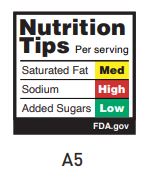Comment now on FDA’s front-of-package label proposals
The FDA is asking for public feedback on an updated research study to decide which front-of-package labeling design will work best to help the public choose healthy fpackaged foods.
To submit comments, go here. They are due by July 17.
I’ve written about this issue previously.
The FDA tried to do this a decade ago. But the Grocery Manufacturers Association (now Consumer Brands Association) did an end run and volunteered to use Facts Up Front/Guideline Daily Amounts, which nobody understands or pays attention to. The FDA caved in and let that happen.
Now countries all over the world are putting warning labels on foods high in calories, fat, salt, and sugar, most of them ultra-processed.
The FDA says it will test 8 front-of-package label designs to see which work best in conveying healthfulness. The study materials are here and here.
Earlier, if those links don’t work, it proposed to test all of these designs.
I don’t think any of the choices is as compelling as Chile’s warning labels, which can be understood easily by children and people who cannot read.

Among the FDA’s choices, here’s my preference (it’s most like the labels from Canada and Brazil).

This still requires people to figure out what it means if the colors differ, as they do here, but surely everyone will understand that the more red boxes, the worse.
One other complaint: Since this effort started, the concept of ultra-processed has become much more prominent and is backed up by a tremendous amount of research.
Avoiding ultra-processed foods is the key message needed now.
The FDA’s proposals will take care of most ultra-processed foods, but miss the point. Whatever the FDA chooses will be out of date no matter when it appears.
Never mind. This is a step in the right direction. Food industry opposition to any of it is strong.
It’s important to tell the FDA to get busy on this, and to strengthen the warning.
Write the FDA NOW!

